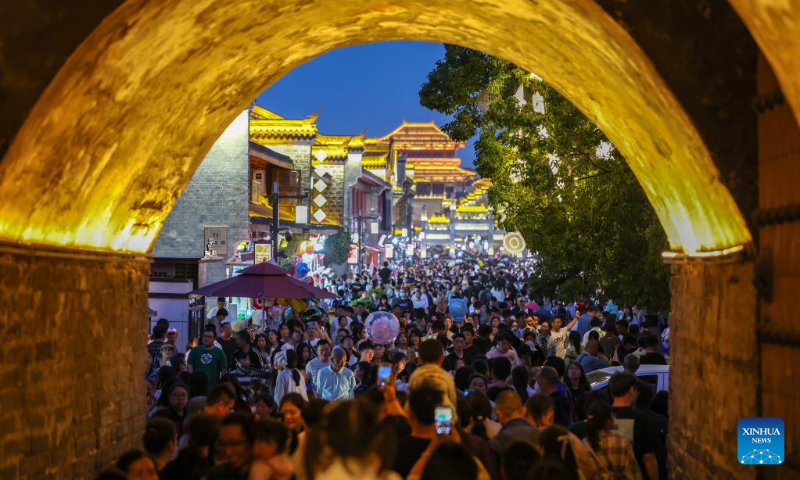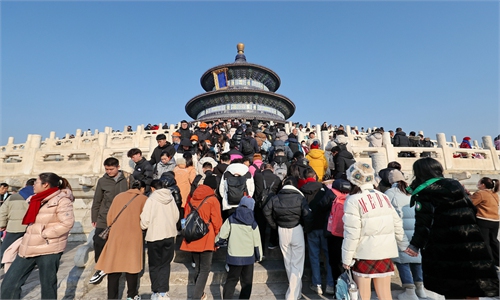'May Day holidays actually only have one day off' – public grumble over make up days

Tourists enjoy night time at the ancient town of Xiangyang City, Central China's Hubei Province, April 30, 2023. Photo: Xinhua
As the May Day holidays approach, Chinese netizens are upset about the country's unique arrangements for nationwide statutory holidays which usually allow people to have several consecutive days off but then require them to work on the weekend before or after the holidays.
Some observers urged revocation of the policy of adjusted working days, while at the same time calling for the country to humanize the policy of statutory holidays. They said that paying more attention to people's needs could stimulate the economy and consumption.
In fact, it has become normal at times of public holidays for netizens to voice their annoyance toward the arrangements.
According to the arrangements, on paper, it looks like people will be given five days off during the upcoming holidays, but when the extra working days are factored in, there is just one day off.
Many netizens complained about similar plans for the Qingming Festival holiday earlier in April, with several consecutive weekends turning into single days off, so there have been "six-day work weeks" before and after the holidays, The Paper reported on Tuesday.
According to the report, some netizens even cited Chinese singer Na Ying's comment on adjusting holidays back in 2013. "My Children have to go to school for seven or eight days in a row, which is really tiring... Life rhythm being disrupted is quite similar to hormonal imbalance. Can the policymakers who set the holidays seriously consider our lives?"
Many netizens expressed their desire to have normal holidays and weekends off. Furthermore, some netizens expressed their hope for longer holidays without the need for adjustments.
In a poll by China Newsweek's official Weibo account on Friday, the option "No adjustments, but longer holidays" received the most votes at 11,000, followed by "Length of holiday doesn't matter, no adjustments needed," with 6,033 votes. Only 517 votes were in favor of "Adjusting holidays to create longer breaks."
Peng Han, chief analyst at Travel Daily, said that public opinion shows a strong desire for policy adjustments regarding the "make-up working day" mode. The root cause lies in the fact that the holiday arrangement does not increase the total holiday time for the public; it simply shifts workdays around, forcing the public to "repay" the missed workdays after enjoying the holidays. This mode is clearly aimed at concentrating holidays to boost consumer spending, rather than allowing the public to truly rest, which is why there is significant public dissatisfaction.
Currently, what are the advantages and disadvantages of China's holiday system? Compared to other countries, are there less holidays in China?
In terms of public holidays, China has a normal allocation. Excluding adjustments, China's public holidays total 11 days, which is comparable to most European and American countries. However, when factoring in paid leave for employees, the total number of holidays for Chinese workers throughout the year is less than that of most countries globally.
Zhang Yiwu, a professor at Peking University, who is also a national political advisor, told the Global Times on Tuesday that the current holiday system has not reduced the number of holidays, but has been increasing over the years. For example, the Spring Festival holiday is longer than it used to be.
Holidays are an overall arrangement throughout the year, which is a complicated situation, but if too many statutory holidays are added, it will also create a burden, while too few holidays will be unfavorable for workers and the protection of labor rights. So how to find a balance is important, Zhang said.
Peng pointed out that providing the public with more real holidays and more opportunities for leave represents a shift in the mindset regarding holidays - whether to focus more on people or on the economy and consumption. In recent years, the policy direction has been toward implementing paid leave.
For example, in July 2023, the General Office of the State Council forwarded the National Development and Reform Commission's "Notice on Measures to Restore and Expand Consumption," which clearly stated "fully implement the paid leave system, encourage staggered leave, and flexible working hours."
Peng stated that in the long run, focusing more on people is truly focusing on the economy and consumption, which is why the country is actively promoting policies such as paid leave.
Furthermore, Cheng Chaogong, chief researcher at the Tongcheng Research Institute, pointed out that there is room for improvement in the current arrangement of statutory holidays, especially in the second half of the year, when there are too few holidays, poor connections between holidays, and an insufficiently rational distribution.
Cheng suggested that holidays that were not observed before could be considered, and specific holidays could be added for peak travel consumption periods like the summer.

